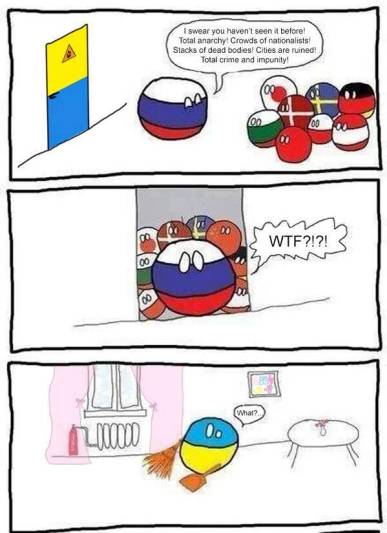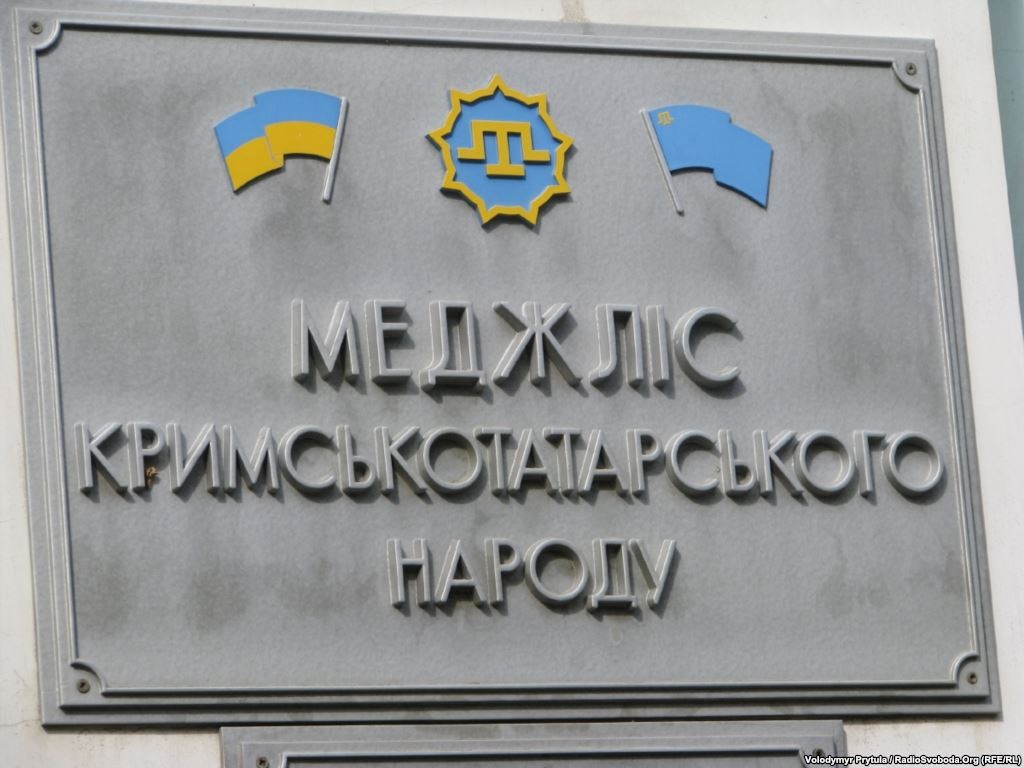Since the crisis in Ukraine took the shape of a fundamental conflict between a growing part of the Ukrainian people and a government of “crooks and swindlers” that, as it later turned out, managed to rob the nation of an approximate 70 billion euro, Russian friends have asked me with increasing urgency for independent media sources to help them follow the events. Initially, when it was not yet clear in what way the standoff would end and the atmosphere at Maidan was still quite joyful, the requests were mainly the result of curiosity, rather than a urgent need to know what was actually happening on the ground. Russian media downplayed the size of the demonstrations, referring to “several thousand” of them, while in fact some 800,000 demonstrators filled Independence Square and all the surrounding streets and alleys. It resulted in jokes in the social media, e.g. a photo of the massive demonstrations with the text: “Special for Russian TV: we are not here.”

In the West, the reports on Ukrainian events were quite scarce, and only a limited group of interested journalists and scholars watched the unfolding events while they occurred. Nobody imagined really that Maidan would lead not only to the fall of the Yanukovych government, but also to an undeclared war between Russia and “the mother of Russia”, Ukraine, and to the return of a standoff between Russia and the West of a vehemence unknown since the heydays of the Cold War. However, as the crisis worsened and the attacks by governmental forces and provocators on the demonstrators led to the first deaths, articles started to appear in the Western media about the 'extremists' at Maidan, the far right groups like Right Sector and the fear for a return of anti-Semitism and (neo-) fascist tendencies.
Having been 'on the ground' repeatedly over the months and having seen the miracle of Maidan, I have become accustomed to the lack of an adequate understanding of what actually transpired. What I have seen is a truly national uprising, led by the first post-Soviet generation that is fed up of being treated like cattle by a thieving regime, and a incredibly well organized machinery run by a wide specter of demonstrators from all sectors of the population, from all ages, and from all classes: rich, poor, no difference. I have seen demonstrators with clearly poor backgrounds, and ~I have seen them arrive in luxury cars and slick suits, opening the trunk of their car and taking our their cask or helmet and baton. This was truly a people’s revolution of a size and scope this part of the world has not seen since February 1917.
Very few people in the West fully understood this, and were taken by surprise when the developments turned bloody in January 2014 and culminated into massive bloodshed on February 18-20, 2014. Part of the ignorance can be explained by a decreased interest and knowledge of post-Soviet affairs, part by the tendency of “free press” to look for the “other side of the story” and part by the success of Putin’s media barrage. What still very few people in the West realize is that we see one of the last phases of the deathbed of Sovietism, and that what is happening now is actually what we expected and feared back in 1990-1991 and then never transpired. We are seeing a country that buries the Soviet past once and for all. The toppling of over 130 Lenin statues in the country is therefore highly symbolic.
For people in Russia this is a time of great anxiety and tension. On one hand they have a more intimate understanding of how the Ukrainian crisis will affect their lives and livelihood, yet on the other hand they are exposed 24/7 to a barrage of propaganda no different than the propaganda machinery of Soviet times. True, people can travel freely and can access internet, but the overwhelming majority of Russians do not travel, many do not use internet and when the barrage of propaganda is permanent and total it is very hard to resist, and unconsciously people start to adapt their opinion to what is being told a zillion times, and start to believe that indeed there are a lot of radicals and extremists at Maidan, that indeed Bandera is revered by the majority of the population, that indeed Russian-speaking parts of the population are under threat and that indeed the country will soon be ruled by a neo-fascist regime.
How many times have I had discussions with Russian friends who in response to an invitation to come to Maidan and see for themselves answer: “but I am Russian, I will be beaten up” or “surely I can’t be there with a Russian flag, I will be attacked”. What do they know that Russian Afghantsy help defend and protect Maidan, that Russian flags are seen equal to Georgian, Crimean Tatar and European Union ones, that one of the battalions at Maidan is a 'Jewish sotnya' and that in general the atmosphere is one of brotherhood, where it doesn’t matter where you come from or what your nationality is, only that you too don’t want to be robbed by a corrupt regime.
The revolution in Ukraine is one in which media played a crucial role. At times when I was not in the country, I would permanently have livestreams on in my computer, and the sounds of the 'drums' of Maidan would fill my office, hotel-rooms or apartments across the region. I was part of it, every day, and together with my social media I kept myself - and through my facebooks others - fully informed. Alternative broadcasts by spilno.tv, espresso.tv, hromadske and others contributed greatly to the success of this revolution and their important work cannot be overvalued.
However, until now one mistake has been made, in my eyes a crucial one. Part of Putin’s propaganda is focused on creating discord between East and West in Ukraine, between the Ukrainian and Russian speaking parts of the nation. It is the argument used to justify his invasion into Crimea, it is the argument used by large groups of Russians crossing the border in the East to create 'local self-defense groups' to fight the 'fascist regime' in Kyiv. We all know it is nonsense, we know Russian is a language spoken freely and widely in the country, but yet we do very little – or too little – to counter his propaganda. Most of the broadcasts are in Ukrainian, with only at certain intervals Russian speaking components or summaries. Yes, sometimes a full day is dedicated to Russian-language broadcasts, as a symbolism – but not as a regularity, a normality.
People in the East should have independent media in their own language, Russian. They should see in practice that it makes no difference, that their language is of equal value to Ukrainian, and that Moscow’s claims that Russian is under threat is utter nonsense. But what is even more important, people in Russia should be able to access independent reporting in Russian, rather than searching the internet for bits and pieces, or having to listen to the Russian service of the BBC. I am not saying that the latter is not important – they do an important job; what I am saying is that the BBC is foreign, it is not “svoi
”, it is not Ukrainian. It should be the Ukrainians themselves who inform both their own population and their Russian brothers and sisters in a language that is easily understood, 24 hours a day.
The void that is now can easily be filled, and it is not too late. The Ukrainian crisis is far from over, we are alas only at the very beginning. Let there be no doubt that Putin has a long term policy plan to destabilize the country, with or without sending troops in for short-term or longer incursions. And what is more, what is now happening in Ukraine is the antechamber of what will happen next: the end of Sovietism in Russia itself. Yes, today it is called Putinism and it increasingly shows itself in ways that are more similar to a national-socialist regime, but in fact Putinism is the last stage of Sovietism, hence the fierce resistance on the part both of pro-Soviet, neo-Soviet, fascist and national-Bolshevik groups in the country.
People in Russia will need to be informed. They need to be able to assess what is going on, they need to see that the thievery of Yanukovych and his gang is child’s play in comparison to what Putin and his gang is engaged in. They need to see that they will never have a normal life until they rid themselves of this criminal gang, that runs the country as its own fiefdom. The only way to achieve this is to engage in a full-scale media war. What Putin can do, we can do too. But we need to strike back with real information, not with propaganda. We need to be ready for the moment when liberty finally comes to Russia itself.
Robert van Voren is Professor of Soviet and Post-Soviet Studies at Vytautas MagnusUniversity in Kaunas and Ilia State University in Tbilisi, and was Permanent Representative of Ukraine in the Benelux for Humanitarian Affairs in 1994-1997.




